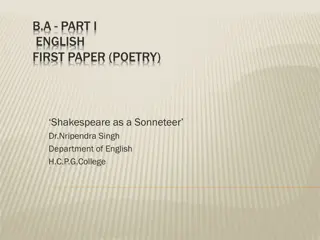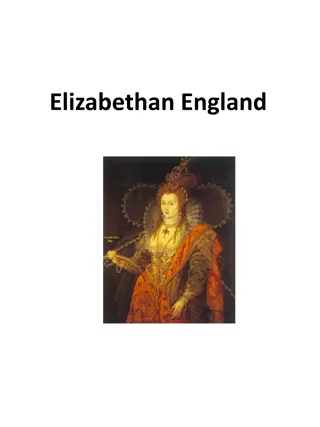Amjed, Lateef, Jabbar: Elizabethan Drama Class
Join Ph.D. English Literature scholars Amjed, Lateef, and Jabbar in a Google Classroom dedicated to the study of Elizabethan Drama. Explore the intricacies of this theatrical genre through engaging discussions, insightful analyses, and collaborative learning activities. Enhance your understanding of classic plays and their cultural significance under the guidance of these experts. Immerse yourself in the world of Elizabethan theatre and expand your knowledge in a dynamic online educational environment.
Download Presentation

Please find below an Image/Link to download the presentation.
The content on the website is provided AS IS for your information and personal use only. It may not be sold, licensed, or shared on other websites without obtaining consent from the author.If you encounter any issues during the download, it is possible that the publisher has removed the file from their server.
You are allowed to download the files provided on this website for personal or commercial use, subject to the condition that they are used lawfully. All files are the property of their respective owners.
The content on the website is provided AS IS for your information and personal use only. It may not be sold, licensed, or shared on other websites without obtaining consent from the author.
E N D
Presentation Transcript
ACT II SCENE I Amjed Lateef Jabbar Ph.D. in English Literature Google Classroom (Elizabethan Drama) Class Code (52zj6rj)
Summary Polonius sends Reynaldo to Paris to spy on Laertes. A distressed Ophelia tells her father of a strange encounter with Hamlet. She reveals that she has ceased all contact with Hamlet, as her father had ordered. Polonius decides that Hamlet has lost his mind because of his love for Ophelia. Polonius rushes to tell the king and queen.
ANALYSIS TIPS Differences in family relations: 1. Hamlet and his father have a loving and loyal relationship, capable of spanning the gulf and bridging the gap between the worlds of the living and the dead. 2. Polonius and Laertes have a relationship that is based on lies and mistrust.
An analysis of the personality of Polonius: 1. Polonius sends his servant Reynaldo to Paris, seemingly to bring money to Laertes. In reality, he sends Reynaldo to find out what Laertes is doing and to report back to Polonius. Control, or the illusion of it, is very important to Polonius. 2. Polonius s sense of control is based on his ability to eavesdrop, gossip, and spy, all the while acting like an absentminded, forgetful old man.
3. He seems unaware that this kind of intrusion into other peoples lives can have disastrous results. His meddling will eventually have deadly consequences for his entire family (foreshadowing). 4. For the first and last time in the play, Polonius sounds genuinely sorry for his interference, and he makes logical sense. 5. Still, in his need to feel important, he decides to bring this news immediately to the king.
The strange behavior of Hamlet: Hamlet, in this scene, behaves like a model of the Elizabethan melancholic lover: He is disheveled and pale, unable to make a sound beyond a sigh. That is why, in his meeting with his beloved Ophelia, he looked at her sadly, grabbed her wrist, stared at her face, and sighed deeply. Then, without ever having said a word, he left her.
The strange behavior of Hamlet in this scene can be interpreted in two ways: 1. This behavior may be part of Hamlet s feigned madness or antic disposition. According to this interpretation, Hamlet may be using Ophelia as a pawn in his game of cat-and-mouse. If he feigns madness, surely she will report it to Polonius, who will then tell the king and queen. As Hamlet indicated at the end of Act I, he wants to create the impression that he is not stable.
2. His actions may be the genuine result of his keenly felt disappointment in Ophelia. Hamlet may have spent the day trying to come to terms with the horrifying news he received from the ghost. He may have wanted to talk to someone, and, naturally, Ophelia (his beloved) would be the one he would choose as confident. But Ophelia has been avoiding him and sending his letters back unopened. Ophelia s rejection could not have come at a worse time for Hamlet. Perhaps his behavior in her room was meant to convey his disappointment.
A Patriarchal Society This type of society is completely controlled by Males (men), because in the Elizabethan Era, people were believing that all men are better than all women (social hierarchy). An example of this sort of society in this scene is: When Polonius asks his daughter Ophelia if she has been talking to Hamlet, she explains that she ceased contact with Hamlet, just as her father ordered.























